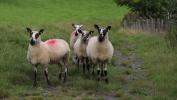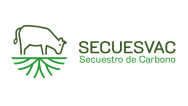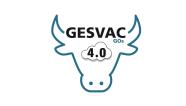CLIMALACT Operational Group: Development of sustainability protocols and indicators for the “climalact” brand
- Type Operational group
- Status In progress
- Execution 2024 -2027
- Assigned Budget 600.000,00 €
- Scope Supraautonómico
- Autonomous community Asturias, Principado de; Galicia
- Main source of financing CAP 2023-2027
- Project website GO CLIMALACT
The CLIMALACT project aims to identify and standardize farm/landscape/value chain management practices associated with the "CLIMALACT" brand and to provide, through co-creative processes (multi-stakeholder methodologies), idiotypes of dairy agri-food systems in Asturias and Galicia based on the computation of simple sustainability and climate neutrality indicators in order to achieve transparency in farm and value chain management and continuous improvement of sustainability.
In this regard, it is necessary to provide farmers with management tools that allow them to achieve sustainability and climate neutrality, guaranteeing a sustainable market, ensuring their future adoption by livestock farmers, and establishing a marketing strategy linked to "CLIMALACT."
- Act. 1. R1: Preparation of a list of sustainability and climate indicators associated with the farm.
- Act. 2. R1: Focus Group.
- Act. 3. R1: Farm data collection through interviews/surveys/data analysis.
- Act. 4. R1: Data analysis.
- Act. 1. R2: Development of sustainability and climate indicators associated with the value chain.
- Act. 2. R2: Focus group.
- Act. 3. R2: Collection of data from the value chain through interviews/surveys/data analysis.
- Act. 4. R2: Data analysis.
- Act. 1. R3: Development of an economic indicator of sustainability of the agri-food chain.
- Act. 2. R3: Development of environmental and social sustainability indicators for the dairy agri-food chain.
- Act. 1. R4: Development of an integrated index.
- Act. 1. R5: Development of climate neutrality measurement protocol.
- Act 1. R6: Application prototype.
- Act. 2. R6: Focus Group for the development of the CLIMALAT brand.
- Act 3. R6: Final prototype.
- Act 1. R7: Analysis and listing of PAC recommendations.
Asturias and Galicia together account for 49% of the animal population and 68% of dairy farms in Spain, representing 4.5% of agricultural production. The dairy agri-food system must be based on the use of sustainable practices based on the quantification of ecosystem services and climate neutrality, with the aim of providing product selection criteria to consumers through brands created for this purpose. The production of milk linked to the "CLIMALACT" brand is essential to meeting these requirements, as it is associated with the use of practices associated with different types of farms (intensive, semi-intensive, semi-extensive, and extensive), including the circular economy, the bioeconomy, and the use of pastureland.
The use of sustainable practices leads to the long-awaited climate neutrality based on the potential for carbon sequestration, the high biodiversity associated with permanent pastures, which is the basis of the ecosystem services they provide at the farm and landscape levels, and the use of technologies that minimize the carbon footprint (e.g., biogas production). The diverse types of farms in Asturias and Galicia that produce milk, with or without associated land that is grazed or not, depending on socioeconomic constraints, means that the CLIMALACT brand must be approached differently, adapting to the idiosyncrasies of each farm type. The CLIMALACT project aims to identify and standardize farm/landscape/value chain management practices associated with the "CLIMALACT" brand and to provide, through co-creative processes (multi-stakeholder methodologies), idiotypes of dairy agri-food systems in Asturias and Galicia based on the computation of simple sustainability and climate neutrality indicators in order to achieve transparency in farm and value chain management and continuous improvement of sustainability.
It is necessary to provide farmers with management tools that allow them to achieve sustainability and climate neutrality, guaranteeing a sustainable market, ensuring their future adoption by livestock farmers, and establishing a marketing strategy linked to "CLIMALACT." Asturias and Galicia together own 49% of the animal population and 68% of dairy farms in Spain, which account for 4.5% of agricultural production. The agri-food system linked to milk must be based on the use of sustainable practices based on the quantification of ecosystem services and climate neutrality, with the aim of providing product selection criteria to consumers through brands created for this purpose.
Milk production linked to the "CLIMALACT" brand is essential to meeting these requirements, as it is associated with the use of practices associated with different types of farms (intensive, semi-intensive, semi-extensive, and extensive), including the circular economy, the bioeconomy, and the use of pastureland. The use of sustainable practices leads to the long-awaited climate neutrality based on the potential for carbon sequestration, the high biodiversity associated with permanent pastures, which is the basis of the ecosystem services they provide at the farm and landscape levels, and the use of technologies that minimize the carbon footprint (e.g., biogas production).
The diverse types of farms in Asturias and Galicia that produce milk, whether or not they have land grazed, depending on socioeconomic constraints, mean that the CLIMALACT brand must be approached differently, adapting to the specific needs of each farm type.
To develop a sustainability and climate-neutral brand, CLIMALACT, based on a study of the current management of the Asturian and Galician dairy production system, considering a combined analysis of the farm and the value chain. This will allow for the selection of best practices associated with different types of farms (intensive, semi-intensive, semi-extensive, and extensive) and value chains (short circuits, national, and international). These practices will be selected based on their impact on the productive fabric and the environment and rural (social) aspects of the sector.
- Act. 1. R1: Preparation of a list of sustainability and climate indicators associated with the farm.
- Act. 2. R1: Focus Group.
- Act. 3. R1: Farm data collection through interviews/surveys/data analysis.
- Act. 4. R1: Data analysis.
- Act. 1. R2: Development of sustainability and climate indicators associated with the value chain.
- Act. 2. R2: Focus group.
- Act. 3. R2: Collection of data from the value chain through interviews/surveys/data analysis.
- Act. 4. R2: Data analysis.
- Act. 1. R3: Development of an economic indicator of sustainability of the agri-food chain.
- Act. 2. R3: Development of environmental and social sustainability indicators for the dairy agri-food chain.
- Act. 1. R4: Development of an integrated index.
- Act. 1. R5: Development of climate neutrality measurement protocol.
- Act 1. R6: Application prototype.
- Act. 2. R6: Focus Group for the development of the CLIMALAT brand.
- Act 3. R6: Final prototype.
- Act 1. R7: Analysis and listing of PAC recommendations.
- Coordinator/entity name: Galician University Business Foundation (FEUGA)
- Postal address: R/Lope Gómez de Marzoa S/N - Campus Vida, Santiago de Compostela, A Coruña
- Coordinator/entity email: l.carbia@feuga.es
- Telephone: 981534180
- Fundación Empresa Universidad Gallega (FEUGA)
- Fundación Empresa Universidad Gallega (FEUGA)
- ASOCIACIÓN PARA EL DESARROLLO DEL TERRITORIO INTERREGIONAL QUE SE UBICA EN EL ENTORNO DEL RIO EO (ASOCIACION INTEREO)
- CAMPOASTUR PRODUCTOS Y SERVICIOS SOCIEDAD COOP. ASTUR.
- UNIÓN DE COOPERATIVAS ASOCIACIÓN GALEGA DE COOPERATIVAS AGRARIAS (AGACA)
- CORPORACIÓN ALIMENTARIA PEÑASANTA, S.A.






